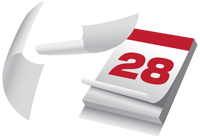Section navigation
Getting your period

Starting your period — or menstruation — is a major part of puberty and means your body now can make a baby. It also means lots of other changes are going on throughout the month.
Feeling a little confused about your period? Check out the links below to learn what your period is and when it comes. You also can skip to our pages on your menstrual cycle, PMS, how to take care of your period, and what to do if you are having period problems.
Some girls find getting their periods very exciting, and others feel uncomfortable about it. It definitely can take a little getting used to! But lots of women come to see their periods as a wonderful sign that their bodies are healthy and working the way they’re supposed to. Follow the links below to learn more.
- What is your period?
- At what age do you get your first period?
- What causes your period?
- Does your period come each month?
What is your period?  top
top
What comes out during your period is the blood and tissue that build up as the lining of your uterus each month.
Your period flow can be light, heavy, or in between. Sometimes menstrual blood also will be different shades of red, from light to dark. You may see some dark clumps or clots of blood, which is normal.
Your period may be heavy the first day or so each time and then decrease on later days.
Periods usually last between three and five days. It is normal to have periods that are shorter or longer, up to seven days. It is also normal if your periods are not the same number of days each month, especially in the first years.
If you think your period is too heavy or have other concerns about your period, see our section on period problems.
At what age do you get your first period?  top
top
Usually, girls get their periods between ages 12 and 14, but it can happen years before or after that. Don’t worry if you get your period later or earlier than your friends get theirs — that happens a lot. If you haven’t gotten your period by age 15 (or within three years of when your breasts started to grow), talk to your parents or guardians, your doctor, or another adult you trust.
What causes your period?  top
top
Natural body chemicals, or hormones, cause your ovaries to release one egg about once a month. Most months, the egg and the lining of your uterus come out of your vagina as your period. This is part of your menstrual cycle.
This cycle is what makes it possible for a woman to have a baby. During sexual intercourse, the egg can get fertilized by a male’s sperm and then attach to the lining of the uterus (endometrium) and grow into a baby. (Read more about reproduction.)
Does your period come each month?  top
top
Menstrual cycles take place over about one month (around 21 to 34 days), but each woman’s cycle is different. Many women have a cycle that lasts 28 days. Some women may have cycles as long as 45 days.
The cycle includes not just your period, but the rise and fall of hormones and other body changes that take place over the month. To see what happens on each day of your menstrual cycle check out our cool guide to your period.
Keep in mind that your periods may not be regular at first. You may have two in one month, or have a month without a period at all. Also, at first your period may last just a couple of days in some months and up to a week in other months. Periods will become more regular in time.
To learn about your own pattern, it's a good idea to keep track of your periods on a calendar or app. Keeping track lets you:
- Get a sense of when to expect your next period
- Know if you missed a period (if it comes on a regular schedule)
- Have a record of your period schedule and when your last one came to share with your gynecologist or other health care provider
When you chart your cycle, remember that it starts with the first day of one period and goes until the first day of the next period.
Content last reviewed April 15, 2014
Page last updated August 27, 2018







